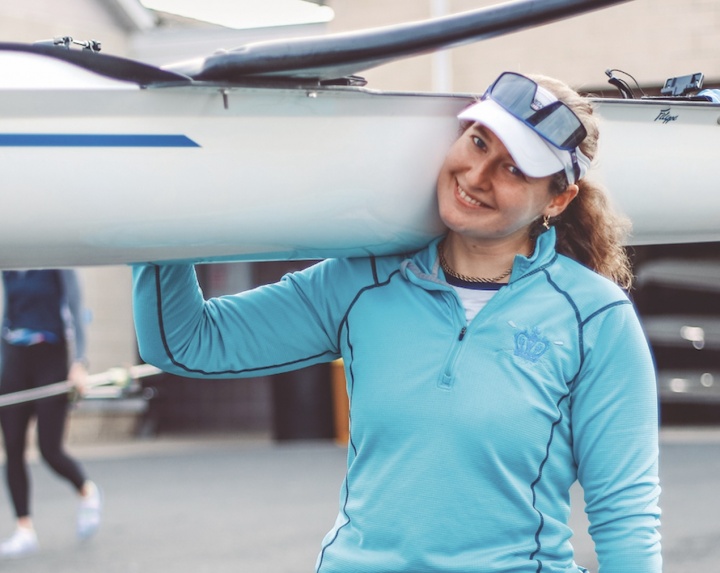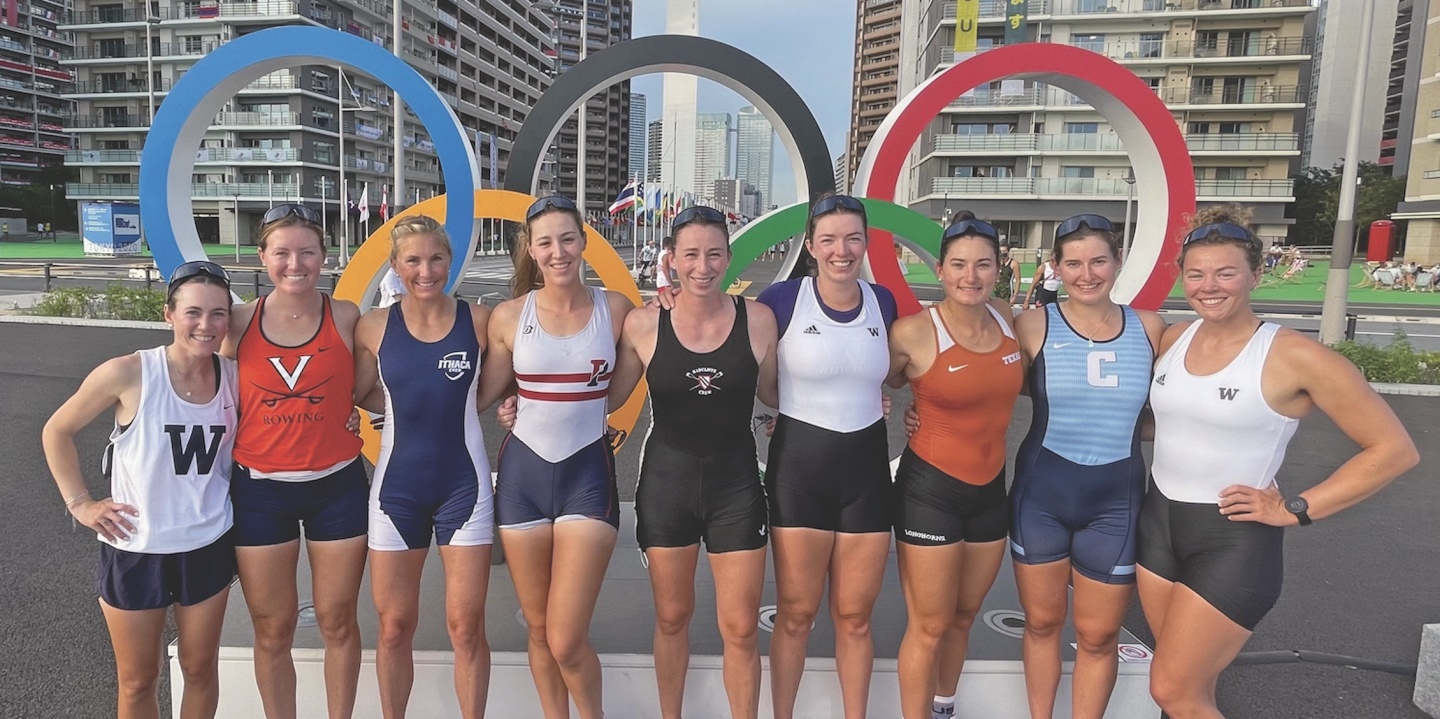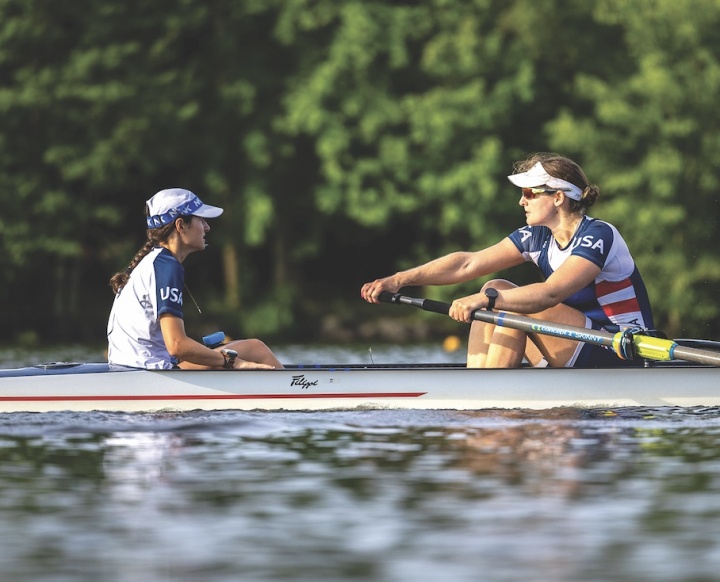The Columbia women’s crew record holder is heading to Paris with Team USA.
Columbia College | Columbia University in the City of New York
This website uses cookies as well as similar tools and technologies to understand visitors’ experiences. By continuing to use this website, you consent to Columbia University’s usage of cookies and similar technologies, in accordance with the Columbia University Website Cookie Notice.
The Columbia women’s crew record holder is heading to Paris with Team USA.

Buck at fall practice at the Caspersen Rowing Center at Mercer Lake in New Jersey.
This and homepage image: Rachel Rane
On that July evening in 2021, they stared at a TV screen in a raucous bar in Nyack, N.Y., as Buck and her seven fellow oarswomen stroked and stroked and stroked some more, desperate to catch the three boats leading the women’s eight rowing final of the Tokyo Olympics. The United States had dominated this event for years, winning gold in 2008, 2012 and 2016. That domination was now in jeopardy on the waters of Tokyo Bay.
It was Buck’s first Olympics, and before the race began, Roger and Sharon kept their expectations for the team — and their daughter, competing in her first Olympics — guarded. “There was a good chance they would medal,” Roger, a geophysics professor at Columbia since 1984, recalls during a recent conversation. Sharon, who graduated from VPS in 1988, cuts in, “A good chance, but no guarantee.”
As the race drew to a close, so did the cheering in the bar. The American boat ended up in fourth. There would be no victory, no medal. Sharon and Roger, clad in matching white T-shirts emblazoned with a crimson rising sun, looked blankly at the screen. In a few hours they would take a phone call from the younger of their two daughters. “She was pretty crushed,” Sharon says. Were there tears? “Yes.”
Three years later, Buck has turned disappointment into resolve. This summer, at the Paris Olympics, she will once again be on the American rowing team, and this time she won’t need to phone home. Her parents and her older sister, Suzanna ’14, expect to be at the Vaires-sur-Marne Nautical Stadium, rooting her on. If all goes according to plan, they’ll see Buck and her teammates reclaim their sport’s top podium position. “I’ve ticked off the box and become an Olympian,” Buck says, “but I want to medal. I’d really like a gold medal.”

At the Olympic village during the Tokyo 2020 Olympics, left to right: Katelin Guregian (coxswain), Kristine O’Brien, Meghan Musnicki, Regina Salmons, Olivia Coffey, Brooke Mooney, Gia Doonan, Buck and Jess Thoennes.
DIEDRE McLOUGHLIN
Such a lofty goal would have seemed ludicrous when Buck entered the College. She joined crew as a walk-on. “The reason I did it was to have friends; it wasn’t to be the best,” Buck says, smiling. Athletics had played only a bit part while growing up in Nyack. She was known mostly for performing in a children’s Shakespeare company. Her parents call her bookish; Sam Warren ’13, the Columbia crew’s associate head coach, doesn’t disagree. “I don’t want to call her a nerd because I know she’ll get mad at me, but she is not your average Olympic athlete,” Warren says.
If Buck’s résumé was thin — she began rowing a month before Orientation — her presence was hard to miss. Six feet tall and broad-shouldered, she had the specs for the sport. She soon showed she also had the stamina — surviving the 6 a.m. practices, the commute to the 218th Street boathouse, the frigid training on the Harlem River — and the strength for it. In fact, Buck owns the Columbia women’s record for doing a 2,000m row in 6:49. “When she was able to break 7 minutes pretty easily, that’s when we knew [of her potential],” says Warren, who coached Buck during her junior and senior years. “That really separates you from most post college-level students.”
Buck acknowledges that rowing provided an outlet for her strength and competitive nature. A subtlety of the sport, though, stirred her obsession. “When you’re rowing well and it feels perfect and you’re in time with all your teammates, nothing feels better. It feels almost magical,” Buck says. “I always keep chasing that moment of perfection.”
After graduation, Buck had more chase in her. For much of the next two years, she trained mostly on her own. The work paid off when she won a spot on the Tokyo squad, becoming just the second Columbia woman to make an Olympic rowing team. (The other was Stacey Borgman BC’98 in 2004.) The day Buck learned she and her teammates were Olympians, “tears streamed down our faces. It was sheer relief and excitement and just exhaustion. I called my college coaches, my parents, everyone. I was like, ‘Guys, I made it!’”

Buck (right) with coxswain Nina Castagna on Mercer Lake.
EAMON GLAVIN
“Because of the mass that has to get moving and the endurance needed to keep your speed,” Ishizuka explains, “races are usually decided, at least in terms of medals, within 250 to 500 meters of the start.” But he watched as the American boat “clawed” its way through the last 500 meters to get the silver medal and an Olympic bid. “That is virtually unheard of, especially in an eight-race of any level.” Positioned in the stroke seat, Buck was the one setting the come-from-behind pace.
Weeks later, at a banquet in New York City, Ishizuka had the chance to talk with Buck about the comeback. “How in the world did you do that?” he asked. “We just had the confidence,” she told him. “We knew we could do it even when we were so far behind.”
The World Championships finish secured the American boat’s place in Paris. Like her teammates, though, Buck would not know for seven months if she had nailed her own Olympic spot. That meant more 6 a.m. practices, weeks of high-altitude training and daily assessments from coaches — all while holding down a part-time sales analyst job with a fintech company. The reward came in April when Buck got the news: Her coaches had selected her for the American team. “It’s crazy, it’s ridiculous,” she says. “My mom keeps telling me that I used to be a couch potato. What happened? I don’t know. Sometimes you just keep putting one foot in front of the other and you end up an Olympian. Nobody would have predicted it.”
Buck won’t make ironclad predictions about Paris; results from Tokyo proved nothing is for sure. What the one-time walk-on does know is she’ll be in the stroke position of the women’s eight-boat. She’s the rower closest to the coxswain, the one setting the pace. “We can do it,” she says, “if we have the race that lives up to our potential.” Asked to clarify “do it,” Buck adds without hesitation, “Gold medal. That’s my goal.”
Charles Butler ’85, JRN’99 is a journalism professor at the University of Oregon. He is researching a book on Lou Little.

Published three times a year by Columbia College for alumni, students, faculty, parents and friends.
Columbia Alumni Center
622 W. 113th St., MC 4530, 6th Fl.
New York, NY 10025
212-851-7852
cct@columbia.edu

Columbia Alumni Center
622 W. 113th St., MC 4530, 4th Fl.
New York, NY 10025
212-851-7488
ccalumni@columbia.edu